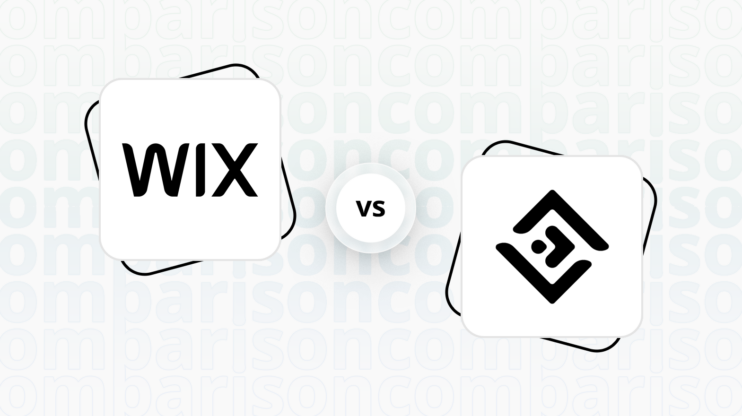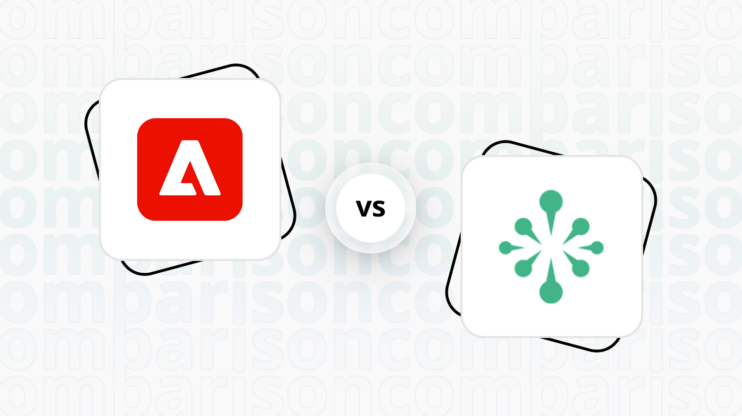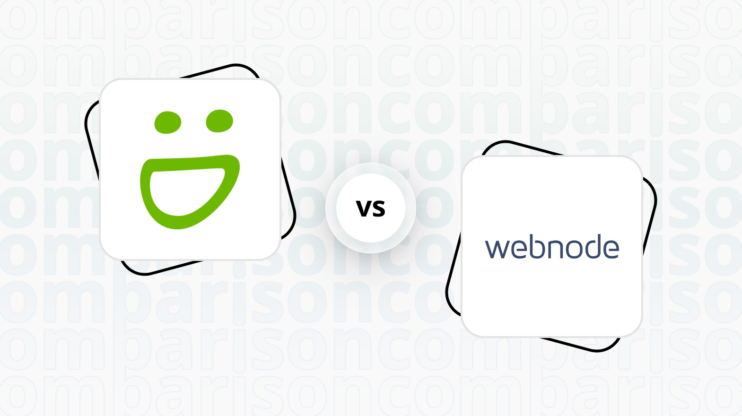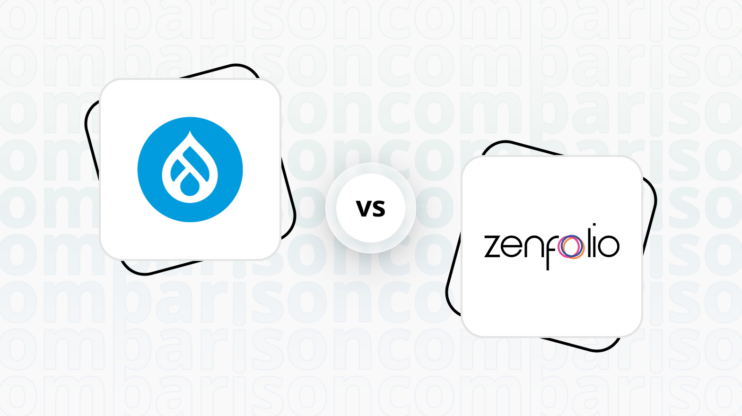Final verdict
Elementor and SubHub both offer unique features tailored to different user needs, but they cater to distinct audiences.
-
Elementor (Overall Grade: 7.4/10)
is a versatile website builder plugin for WordPress, known for its flexibility and extensive design functionalities. It is ideal for users who want to create highly customizable websites without coding. Elementor excels in providing a wide range of templates, robust ecommerce capabilities through WooCommerce integration, and comprehensive marketing tools. When comparing Elementor vs SubHub, Elementor stands out for its user-friendly interface, advanced AI capabilities, and strong customer support, making it suitable for both beginners and professional web designers. -
SubHub (Overall Grade: 5.6/10)
is designed specifically for creating and managing membership sites. It offers tools tailored for content creators and entrepreneurs looking to build a community and monetize their content. SubHub simplifies the process of setting up subscription models and managing member access. Considering Elementor vs SubHub, SubHub is ideal for users who prioritize ease of use and efficiency in managing membership-based businesses. However, it lacks some advanced features and flexibility found in other platforms, making it less suitable for users seeking extensive customization options.

|

|
|
|---|---|---|
|
Design functionalities & templates |
9.2 |
6.8 |
|
Ease of use |
8.8 |
7.7 |
|
Ecommerce |
7.6 |
5.9 |
|
Website Editors |
8.5 |
6.9 |
|
Product testing options |
5.6 |
7.0 |
|
Price |
8.0 |
6.8 |
|
Hosting quality |
7.8 |
5.5 |
|
Website speed optimization |
6.7 |
5.6 |
|
Plugins and integrations |
7.6 |
5.7 |
|
Marketing features |
7.8 |
5.7 |
|
Customer support |
7.2 |
6.3 |
|
Security |
9.1 |
4.0 |
|
AI capabilities |
7.4 |
0 |
|
User Management |
8.8 |
5.2 |
Best for ecommerce
 7.6
7.6
 5.9
5.9
Verdict
: Elementor is more versatile and feature-rich for ecommerce, while SubHub is tailored for membership-based businesses but lacks in-depth ecommerce functionalities.
-
Elementor
: Known for its integration with WooCommerce, Elementor offers a robust ecommerce solution with customizable product pages, a variety of ecommerce-specific widgets, and responsive design templates. It is ideal for users who need flexibility and extensive customization options. However, users may face a learning curve and potential performance issues with extensive widget use. Best For Ecommerce score: 7.6 -
SubHub
: Designed specifically for membership sites, SubHub offers tools for selling physical goods, digital products, and pay-per-view content. It simplifies the process of setting up subscription models and managing member access. However, it lacks support for distributing free products and does not manage the dispatch of physical goods, making it less suitable for traditional ecommerce. Best For Ecommerce score: 5.9
Best for informational & business websites
 8.9
8.9
 7.2
7.2
Verdict
: Elementor is the superior choice for creating informational business websites, offering extensive design flexibility and a user-friendly interface. SubHub, while effective for membership sites, lacks some of the advanced features and customization options that Elementor provides.
-
Elementor
: Elementor excels in creating visually appealing and highly customizable informational websites. Its drag-and-drop interface, extensive range of widgets, and templates make it suitable for both beginners and professional web designers. With a score of 8.9, Elementor stands out for its flexibility and ease of use, making it an excellent choice for businesses looking to create a strong online presence without needing to write code. -
SubHub
: SubHub is tailored for membership sites, offering tools for content creators and entrepreneurs to build and monetize their communities. While it scores 7.2 for informational business websites, it may not provide the same level of design flexibility and advanced features as Elementor. SubHub is ideal for those specifically looking to manage membership-based content but may fall short for broader informational website needs.
Detailed comparison
Design functionalities & templates
Design FunctionalitiesRepresents how well each platform allows for creative design and customization of websites.Score Components:
- Template Variety (30%): Range and quality of design templates.
- Customization (30%): Flexibility and options for design alterations.
- User Interface (20%): Ease and intuitiveness of the design process.
- Responsiveness (10%): Adaptability to different devices and screen sizes.
- Innovation (10%): Unique design features and tools.
 9.2
9.2
 6.8
6.8
🏆
Winner: Elementor.
If you’re looking for a platform that offers more creative control and a wide array of design features, Elementor is the preferred choice.
Elementor offers an extensive range of templates and designs, with over 100 responsive website kits covering various categories like business, creative, education, and more, directly available through Elementor’s platform. Additional sources like Envato Elements, Template Monster, and others provide a wider selection, including free and premium options, catering to diverse web design needs.
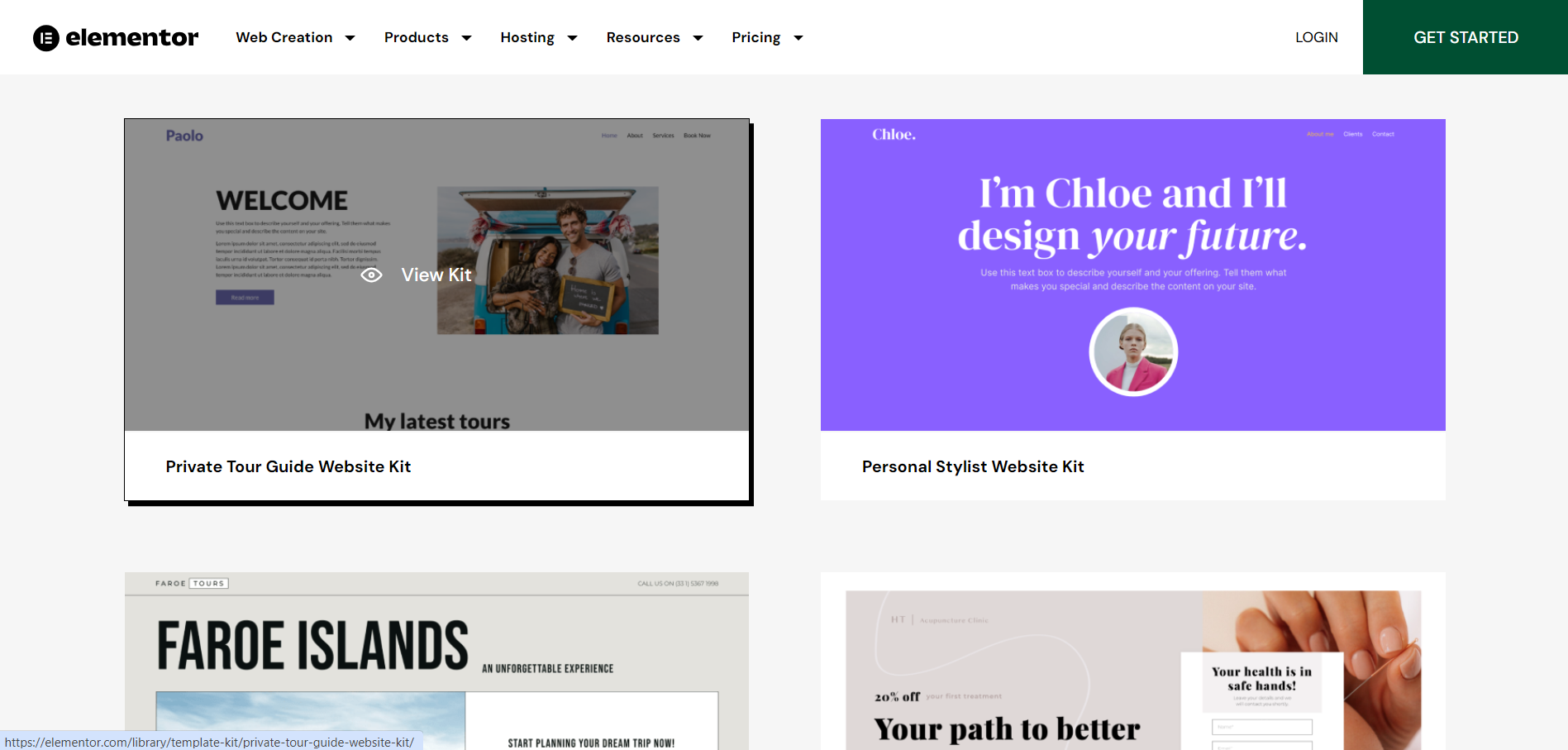

Compared to Elementor, SubHub website builder offers a variety of customizable membership website templates designed to cater to different needs and themes, including fitness, yoga, relationship, ministry, learning, craft, wellness, business, and modern living, among others. There are 14 specifically themed templates available, each designed to help users jump-start the design of their membership website homepages. These templates are fully customizable, allowing users to modify layouts, add or remove sections, and tailor content to fit their brand, ensuring flexibility in the design process.
Get a head start on website creation with AI
Create a custom website tailored to your business needs 10X faster with 10Web AI Website Builder!
Ease of use
Ease of useReflects the platform’s overall user-friendliness.Score
Components:
- Learning curve (40%): Quickness and ease of getting started.
- Interface design (30%): Simplicity and intuitiveness of layout.
- User guidance (20%): Quality of tutorials and support.
- Flexibility (10%): Adaptability to various user skills.
 8.8
8.8
 7.7
7.7
🏆 Winner: Elementor
. Scoring an impressive 8.8, Elementor is renowned for its user-friendly interface and drag-and-drop functionality, making it easy for both novices and professionals to create websites. SubHub, with a score of 7.7, offers a user-friendly platform designed specifically for building membership websites and online courses. However, it may lack some advanced features found on other platforms.
Learning Resources
🏆 Winner: Elementor
. Elementor provides an extensive array of learning resources suitable for both beginners and advanced users through its Elementor Academy. SubHub also offers a range of learning resources, including video guides and tutorials, but Elementor’s resources are more comprehensive.
For ecommerce
EcommerceMeasures the platform’s effectiveness in supporting online business activities.Score Components:
- Ecommerce themes and templates (20%): Variety and design of templates.
- Product management (25%): Ease of managing and organizing products.
- Payment options (25%): Variety and convenience of payment methods.
- Ecommerce features (20%): Features for managing an ecommerce store.
- Integration (10%): Compatibility with external e-commerce tools and services.
 7.6
7.6
 5.9
5.9
Elementor and SubHub offer different ecommerce capabilities tailored to their users’ needs. Elementor, through its integration with WooCommerce, provides a robust ecommerce solution with customizable product pages, a variety of ecommerce-specific widgets, and responsive design templates. However, users may face a learning curve and potential performance issues with extensive widget use. On the other hand, SubHub, designed specifically for membership sites, offers tools for selling physical goods, digital products, and pay-per-view content. However, it lacks support for distributing free products and does not manage the dispatch of physical goods.

|

|
|
|---|---|---|
|
Ecommerce themes and templates |
7.8 |
3.0 |
|
Product page customization |
8.4 |
6.5 |
|
Payment processing and commissions |
7.5 |
7.0 |
|
POS capabilities |
5.5 |
0.0 |
|
Payment gateways |
7.0 |
6.0 |
|
Product numbers |
7.0 |
5.0 |
|
Additional ecommerce features |
8.0 |
4.5 |
Elementor ecommerce features:
- WooCommerce Integration
- Customizable Product Pages
- Ecommerce Widgets
- Product Categories and Filters
- Shopping Cart Customization
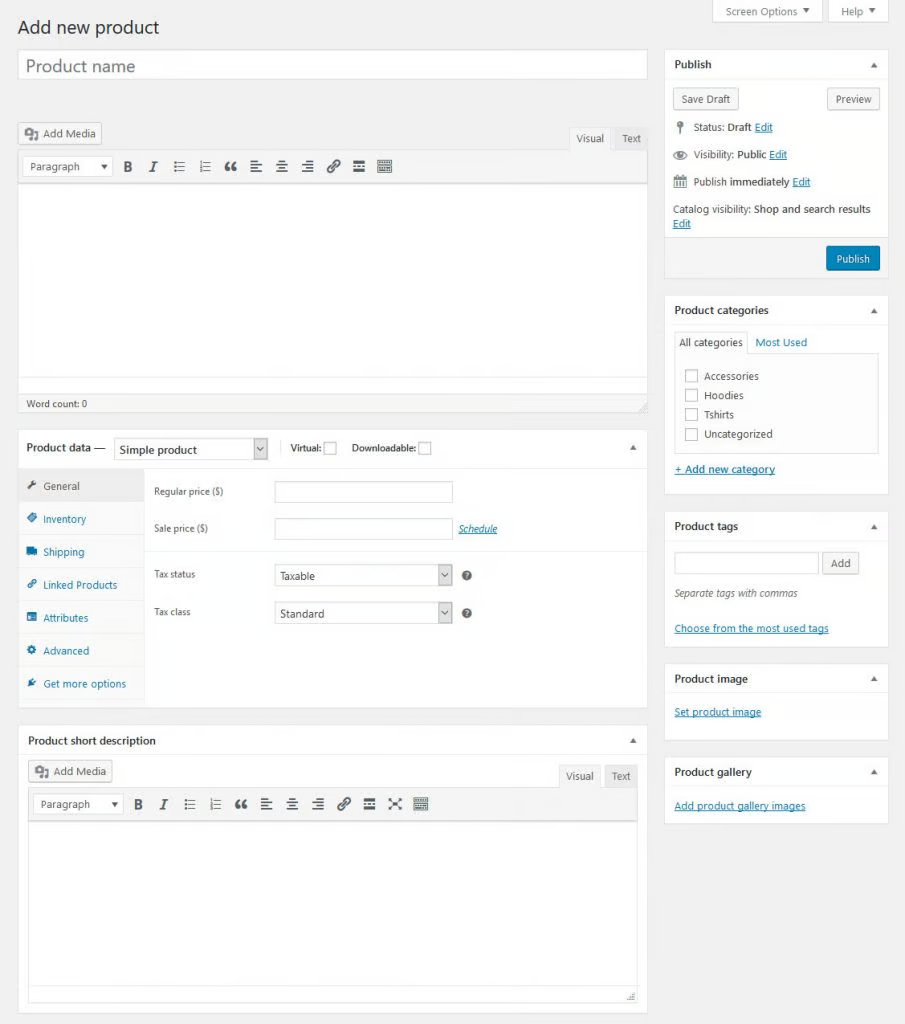
SubHub ecommerce features:
- Paypal and Stripe integration
- Physical and Digital product listings
- Pay-per view products
Ecommerce themes & templates
Elementor offers a diverse range of ecommerce-specific templates suitable for various online stores. These templates are designed to be mobile-responsive and SEO-friendly, ensuring optimal performance across devices and search engines. However, users may encounter issues like slow loading speeds or broken links. SubHub, on the other hand, does not offer ecommerce specific templates.
Product page customization
Elementor offers extensive customization options for WooCommerce product pages, including custom layouts, WooCommerce widgets for various product elements, and options for styling product galleries and ‘Add to Cart’ buttons. It allows for the display and customization of product variants, although the number of variants is technically limited by WooCommerce, not Elementor. SubHub offers a range of product page customization options, allowing for the addition of physical items, digital downloads, and pay-per-view content. Features include the ability to manage product variants, upload images, and set visibility preferences.
Payment processing
Elementor supports several payment gateways, notably through plugins and integrations, with Stripe and PayPal being prominent options for simple and widespread use. These gateways charge their own transaction fees, typically around 2.9% + $0.30 per transaction, but Elementor itself does not impose additional fees for transactions. SubHub supports two main payment gateways: Stripe and PayPal. These integrations allow for secure payment processing for subscriptions and store items using debit or credit cards. The platform itself does not charge commissions on transactions.
Website Editors
Website EditorsEvaluates the platforms’ website building and editing capabilities.Score Components:
- Customization tools (40%): Range and power of editing features.
- Editor usability (30%): User experience within the editor.
- Design flexibility (20%): Freedom in layout and design changes.
- Update and maintenance ease (10%): Simplicity of updating and maintaining the site.
 8.5
8.5
 6.9
6.9
🏆
Winner: Elementor
. Elementor, with a score of 8.5, offers a popular website builder plugin for WordPress that allows users to create and edit websites through a visual drag-and-drop interface. It offers a wide range of widgets and templates, enabling users to design their sites without needing to write code. Elementor is known for its flexibility, allowing for the customization of every detail on a webpage, making it suitable for both beginners and professional web designers.
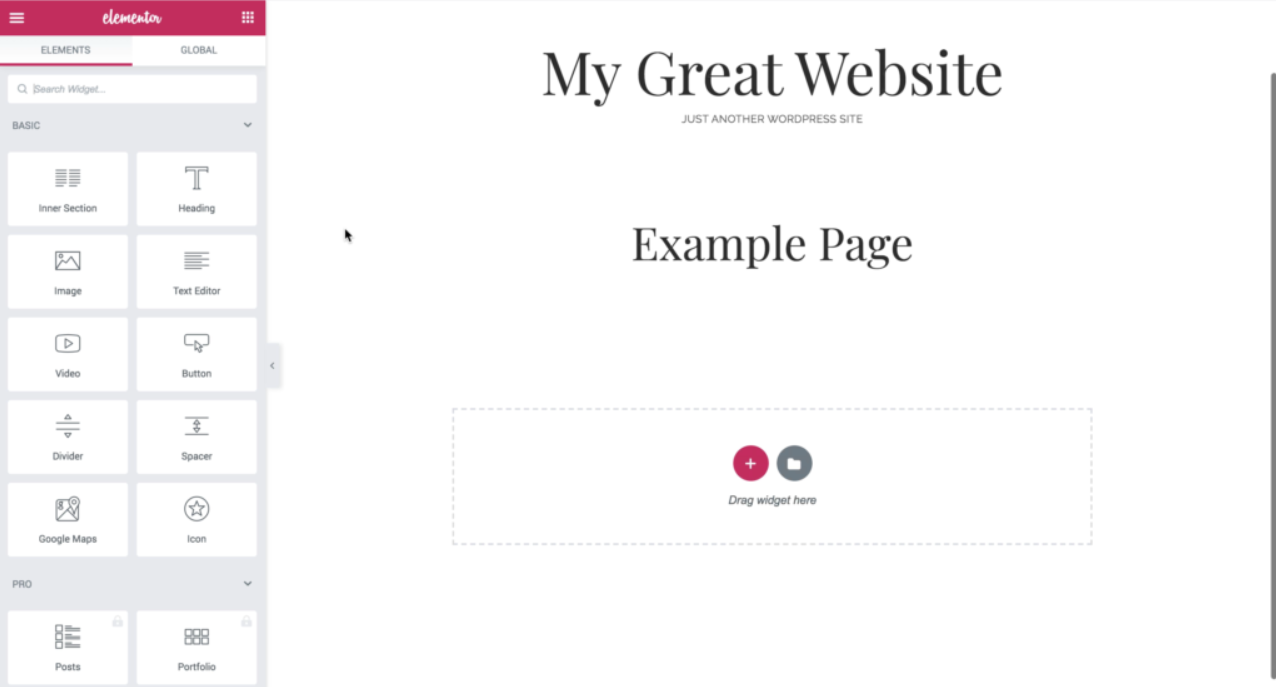
SubHub’s editor, scoring 6.9, is designed specifically for creating and managing membership sites. It offers a range of tools tailored for content creators and entrepreneurs who aim to build a community and monetize their content. The platform simplifies the process of setting up subscription models, managing member access, and providing exclusive content, making it an ideal choice for those looking to start or grow their membership-based business.
Mobile editor/app
 0
0
 4.0
4.0
🏆
Winner: SubHub
. Neither Elementor nor SubHub offer a dedicated mobile editor app. However, SubHub allows users to manage some content on their website using the mobile browser version. It’s important to note that it’s not possible to change the layout and design of the website on mobile with SubHub. On the other hand, Elementor does not provide any mobile editing capabilities.
Therefore, despite its limitations, SubHub is the winner in this comparison due to its ability to perform some content management tasks on mobile.
Product testing options
Product Testing OptionsAssesses the options for trying out platform features before commitment.Score Components:
- Trial quality (40%): Extent and usefulness of the trial or free version.
- Feature accessibility (30%): How many features are available to test.
- Trial duration (20%): Length of the trial period.
- Ease of transition (10%): Smoothness of moving from trial to paid plans.
 5.6
5.6
 7.0
7.0
Overall Result
:
SubHub Wins
. SubHub scores 7.0, higher than Elementor’s 5.6, in product testing options. SubHub offers a 14-day free trial, during which users can test all premium features. It also provides a 7-day money-back guarantee. On the other hand, Elementor offers a free version but only for self-hosted WordPress.org. It does not offer a trial version, but users can test all premium features during the refundable period. Elementor also provides a 30-day money-back guarantee.

|

|
|
|---|---|---|
|
Free Plan |
Yes, but only for self-hosted WordPress.org |
No |
|
Trial Duration |
No trial version |
14 days |
|
Testing Premium Features |
During the refundable period |
During the free trial |
|
Money Back Guarantee |
30-day money back guarantee |
7-day money back guarantee |
Price
PriceLooks at the cost-effectiveness and value for money of each platform.Score Components:
- Plan value (40%): What each pricing tier offers.
- Transparency and clarity (30%): Clearness of pricing structures.
- Flexibility of plans (20%): Range of options to suit different budgets.
- Hidden costs (10%): Additional expenses not included in the plan.
 8.0
8.0
 6.8
6.8
Elementor and SubHub offer different pricing structures, with Elementor providing more options for different needs.

|

|
|
|---|---|---|
|
$0-$10 |
Basic ($9.99/month): 1 website, with 10GB SSD storage, 25k monthly visitors, 30GB monthly bandwidth, daily auto backups stored for 14 days, Cloudflare CDN, and integrated caching tool. Value for price: 6.5 |
No offering at this amount. |
|
$10-$20 |
Business ($19.99/month): 1 website, with 20GB SSD storage, 50k monthly visitors, 50GB monthly bandwidth, daily auto backups stored for 30 days, Cloudflare CDN, integrated caching tool and access to staging environment. Value for price: 7.5 |
No offering at this amount. |
|
$20-$30 |
Grow ($22.99/month): 3 websites, with 30GB SSD storage, 75k monthly visitors, 75GB monthly bandwidth, daily auto backups stored for 30 days, Cloudflare CDN, integrated caching tool, access to staging environment and site cloning. Value for price: 8.5 |
No offering at this amount. |
|
$40-$50 |
Scale ($49.99/month): 10 websites, with 40GB SSD storage, 100k monthly visitors, 100GB monthly bandwidth, daily auto backups stored for 30 days, Cloudflare CDN, integrated caching tool, access to staging environment and site cloning. Value for price: 9.0 |
Starter ($47/month): Up to 500 members, 5 GB storage, secure payment processing, course builder, 5 landing pages, e-commerce. Value for price: 6.5 |
|
$90-$100 |
No offering at this amount. |
Pro ($97/month): Up to 2000 members, 50 GB storage, removes SubHub branding, 15 landing pages, along with Starter features. Value for price: 7.5 |
|
$100+ |
No offering at this amount. |
Premium ($147/month): Unlimited members, 200 GB storage, email white labelling, 30 landing pages, plus all Pro features. Value for Price: 8.5 |
location. As a result in rare cases the prices displayed here can differ from the ones you see on their
websites.
Hosting quality
Hosting
qualityExamines the reliability and performance of the hosting solutions.Score Components:
- Uptime (40%): Consistency and reliability of website availability.
- Speed (30%): Loading times and performance.
- Bandwidth and storage (20%): Sufficiency of resources provided.
- Data centers (10%): Quality and distribution of hosting infrastructure.
 7.8
7.8
 5.5
5.5
🏆
Winner: Elementor
Elementor offers managed WordPress hosting with a 99.9% uptime guarantee and a data center in Belgium. SubHub also offers hosting services, but it does not provide uptime statistics or guarantees, and does not disclose the locations of its data centers. This gives Elementor a higher hosting quality score.

|

|
|
|---|---|---|
|
Do they offer hosting? |
Yes, included in all their plans |
Yes, included in all their plans |
|
Data Centers: |
1 data center in Belgium |
Not disclosed |
|
Type of hosting: |
Managed WordPress Hosting |
Managed Cloud Hosting |
|
Uptime: |
99.9% |
Not provided |
|
Uptime Guarantee: |
Yes, 99.9% |
No |
Website Speed Optimization
Website Speed OptimizationEvaluates optimization of website loading timesScore Components:
- PageSpeed Score (30%): Google’s score indicating performance optimization.
- Loading Time (30%): The average time until a website is fully interactive.
- Mobile Optimization (15%): Optimization effectiveness for mobile devices.
- Resource Optimization (15%): Optimizing images, scripts, and other heavy resources.
- CDN Usage (10%): Use of CDN to enhance speed across geolocations.
 6.7
6.7
 5.6
5.6
🏆 Winner: Elementor
Both Elementor and SubHub prioritize website performance and page speed, but Elementor has a slightly higher website speed optimization score.

|

|
|
|---|---|---|
|
Focus |
Website performance and page speed |
Website performance and page speed |
|
Performance Tools |
Not specified |
Not specified |
|
Key Strategies |
Lazy Loading, Code Minification, Caching, CDN |
Image Optimization, Caching, Mobile Optimized design |
|
Load Times |
Varies depending on optimization and website complexity |
Varies depending on optimization and website complexity |
|
Page Speed Scores Range |
Not specified |
Not specified |
|
Core Web Vitals Improvement |
Not disclosed |
Not provided |
Elementor, a popular website builder plugin for WordPress, prioritizes website performance and page speed. It uses strategies like lazy loading, code minification, caching, and CDN for speed optimization. However, Elementor does not disclose any information about its Core Web Vitals improvements. The load times and PageSpeed scores for Elementor vary depending on optimization and website complexity.
SubHub, a website builder designed specifically for creating and managing membership sites, also prioritizes website performance and page speed. It uses strategies like image optimization, caching, and mobile-optimized design for speed optimization. Like Elementor, SubHub does not provide any information about its Core Web Vitals improvements. The load times and PageSpeed scores for SubHub also vary depending on optimization and website complexity.
Get a head start on website creation with AI
Create a custom website tailored to your business needs 10X faster with 10Web AI Website Builder!
Plugins and integrations
Plugins and integrationsMeasures the range and effectiveness of additional plugins and integrations.Score Components:
- Variety of options (40%): Range of available add-ons.
- Integration smoothness (30%): Ease of integrating plugins into the site.
- Quality of plugins (20%): Functionality and reliability of the options.
- Custom integration capabilities (10%): Support for custom or third-party integrations.
 7.6
7.6
 5.7
5.7
🏆 Winner: Elementor.
With a score of 7.6, Elementor offers a wide range of both free and premium add-ons that extend its functionality beyond the base version. These add-ons offer advanced widgets, modules, and complete theme building capabilities for deep customization. They enable superior integration with WooCommerce, third-party services, and provide advanced marketing tools to enhance conversions and user engagement.
On the other hand, SubHub, with a score of 5.7, offers a set of built-in features, including customizable designs, member management, and subscription management, along with limited third-party integrations primarily with MailChimp, Google Analytics, and payment gateways like Stripe and PayPal. While Subhub provides a comprehensive toolkit for creating and managing membership sites, its range of external integrations might be seen as limited compared to other website builders.
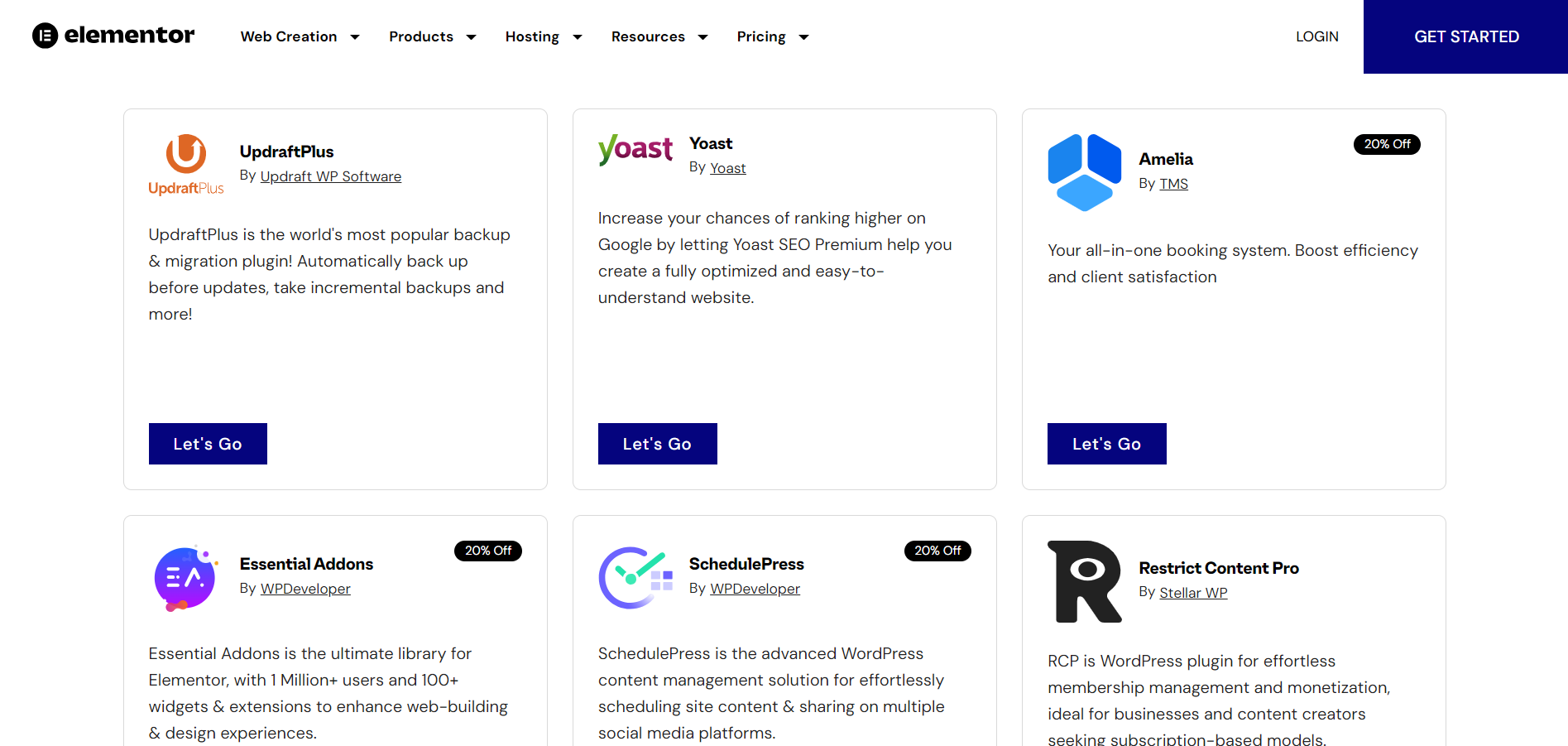
Marketing Features
Design FunctionalitiesRepresents how well each platform allows for creative design and customization of websites.Score Components:
- Template Variety (30%): Range and quality of design templates.
- Customization (30%): Flexibility and options for design alterations.
- User Interface (20%): Ease and intuitiveness of the design process.
- Responsiveness (10%): Adaptability to different devices and screen sizes.
- Innovation (10%): Unique design features and tools.
 7.8
7.8
 5.7
5.7
🏆
Overall Winner: Elementor
. Elementor stands out for its comprehensive marketing tools, especially in SEO, email marketing, and social media integration. SubHub, while lacking in social media integration, offers a range of marketing features suitable for membership-based businesses.

|

|
|
|---|---|---|
|
SEO Tools |
✓ (with integration of various SEO plugins) |
✓ |
|
Email Marketing |
✓ (with integration of various email marketing services and plugins) |
✓ (both built in and through integration of Mailchimp) |
|
Blogging |
✓ |
✓ |
|
Social Media Integration |
✓ (integration of social media buttons) |
✗ |
|
Analytics and Reporting |
✓ (with integration of Google Analytics) |
✓ |
|
Ads and Promotions |
✓ |
✓ |
Customer Support
Customer supportEvaluates the quality and availability of support options.Score Components:
- Response time (40%): Speed of support responses.
- Support quality (30%): Effectiveness and helpfulness of the support.
- Availability (20%): Range of support channels (phone, chat, email).
- Resource richness (10%): Quality of self-help and educational materials.
 7.2
7.2
 6.3
6.3
🏆 Winner: Elementor
. In the Elementor vs SubHub comparison, Elementor takes the lead with a higher customer support score of 7.2. Elementor offers 24/7 support through ticketing and live chat, ensuring users can get help at any time. This round-the-clock availability is a significant advantage for users who may encounter issues outside of regular business hours.
SubHub, on the other hand, provides support primarily through email and a support portal, with an FAQ section for common questions. While SubHub’s support is responsive and accessible, it lacks the 24/7 availability that Elementor offers, which can be a drawback for users needing immediate assistance. With a customer support score of 6.3, SubHub’s support is reliable but not as comprehensive as Elementor’s.
Security
SecurityLooks at the platforms’ security measures and data protection.Score Components:
- Data protection (40%): Safeguards for user and customer data.
- SSL and encryption (30%): Implementation of secure connections.
- Compliance (20%): Adherence to industry security standards.
- Regular updates (10%): Frequency of security updates and patches.
 9.1
9.1
 4.0
4.0
🏆
Winner: Elementor
. Elementor’s security measures are robust and comprehensive, leveraging Google Cloud’s infrastructure for high security, including end-to-end encryption. Their hosting solutions cater to various needs, integrating seamlessly with Elementor’s website building tools for a comprehensive user experience. The company is committed to transparency in its use of cookies and tracking technologies, adhering to GDPR and other data protection regulations, allowing users to manage their data rights effectively. Elementor ensures website security and performance through advanced hosting features, including the use of Google Cloud Platform’s C2 servers and integration with Cloudflare’s Enterprise CDN, to deliver fast loading times and global reach. It employs both active and passive security measures, including 24/7 monitoring, regular updates, backups, and specialized security protocols to protect against common threats. Elementor’s commitment to security is further emphasized by its ISO 27001 certification and a proactive Bug Bounty program, aimed at harnessing the community’s power for continuous security improvement.
SubHub, on the other hand, does not disclose any specific information about the website security measures it provides. While it does emphasize compliance with GDPR and CCPA regulations in its privacy policy, the lack of transparency regarding its security measures is a concern.
AI Capabilities
AI capabilitiesMeasures the effectiveness of AI-driven features and tools.Score Components:
- Automation efficiency (40%): Impact of AI on streamlining processes.
- Personalization (30%): AI-driven customization for users or customers.
- AI-Assisted design (20%): Role of AI in website design and functionality.
- Data analysis (10%): Use of AI in interpreting user data and analytics.
 7.4
7.4
 0
0

|

|
|
|---|---|---|
|
AI Builder |
Elementor’s AI builder generates text, custom codes, and images directly within the editor |
|
|
AI Ecommerce features |
AI-driven features for eCommerce websites, including the ability to generate container layouts, custom images, text, and code directly within the editor |
|
|
AI Content Generation |
AI content generation capabilities enhance website creation on WordPress by offering text and code generation, including HTML and CSS customization, as well as AI-based image solutions |
|
|
Additional AI features |
Ability to integrate many third-party AI powered WordPress plugins or widgets into Elementor |
|
🏆 Winner: Elementor
. Elementor, with a score of 7.4, utilizes AI to enhance the website creation process. Its AI features focus on generating text, custom codes, and images directly within the editor, enhancing efficiency and creativity in web design. Elementor’s AI also simplifies content creation and website customization, offering tools for image generation, text writing, and code creation, catering specifically to the needs of eCommerce site builders.
SubHub, on the other hand, does not have any AI capabilities.
User Management
User ManagementAssesses the platforms’ capabilities in managing user roles, permissions, and accessibility.Score Components:
- Role Customization (40%): Flexibility in creating and defining user roles and
permissions. - Ease of Management (30%): User interface and tools for managing users.
- Access Control (20%): Effectiveness of access control measures for different user
levels. - Scalability (10%): Ability to manage a growing number of users efficiently.
 8.8
8.8
 5.2
5.2
🏆 Winner: Elementor
. User management in Elementor and SubHub involves different approaches to website editing access.
- Elementor operates on WordPress, so the number of users who can edit or manage a website depends on the roles and permissions set within WordPress. Administrators have full access to edit any part of the site, including Elementor settings, while Editors can manage posts and pages made with Elementor. Authors and Contributors have limited capabilities, with the former being able to manage their own posts. Elementor Pro offers a Role Manager feature, enabling further customization of what different roles can do within Elementor.
- SubHub allows multiple user accounts, however the platform does not specify how many accounts are supported.
Elementor User Roles and Access Levels:
| Role | Description | Access Highlights |
|---|---|---|
| Administrator | Users with full access to all administration features, including Elementor settings. | Can edit all content, Access to Elementor settings, Can install plugins and themes, Can manage users |
| Editor | Users who can manage and publish content including pages and posts. | Can edit pages/posts created with Elementor, Cannot access Elementor settings, Can manage categories, tags, and links, Can moderate comments |
| Author | Users who can publish and manage their own posts. | Can create posts with Elementor, Cannot edit pages, Limited access to media library, Cannot access Elementor settings |
| Contributor | Users who can write and manage their own posts but cannot publish them. | Can create content with Elementor, Cannot publish or edit pages, No access to Elementor settings, Submissions require review by higher-level roles |
SubHub User Roles and Access Levels:
| Role | Description | Access Highlights |
|---|---|---|
| Administrator | Full access to the platform except for Homepage and Course Editor. | Can manage all aspects of the platform, including content, store, and member management. |
| Content Management | Focuses on managing and organizing content within the platform. | Can access and manage content-related features but does not have access to Homepage or Course Editor. |
| Store (access only) | Specializes in handling the platform’s store features. | Limited to store management functions; no access to Homepage, Course Editor, or member management. |
| Member Manager (access only) | Oversees member accounts, roles, and subscriptions. | Can manage members and their subscriptions but cannot access Homepage, Course Editor, or store management. |
| *Origin Admin Email | The initial administrator with the highest level of access, including Homepage and Course Editor. | Exclusive access to Homepage and Course Editor, on top of what the Administrator role provides. |
Additional Features

|

|
|
|---|---|---|
|
SSL Certificate |
|
|
|
Custom Domain |
|
|
|
Free Custom Domain Included |
|
|
|
International Domains |
|
|
|
Mobile Responsive |
|
|
|
Page Speed |
|
|
|
Website Builder Mobile App |
|
|
|
Convert a Website To An App |
|
|
|
Website Analytics |
|
|
|
Multilingual Sites |
|
|
|
Multiple Users |
|
|
User Feedback
Elementor is widely appreciated for its intuitive drag-and-drop interface, enabling rapid creation of professional and responsive websites without coding skills. It offers a vast range of templates and compatibility with WordPress, making it a go-to for diverse users. Despite its benefits, concerns arise regarding website loading times, subscription costs, and occasional compatibility issues. Feedback on customer support and legacy plan management is mixed, with some users experiencing dissatisfaction. Overall, Elementor is valued for its efficiency in web development, although some aspects, particularly support services, could be improved.
User feedback on SubHub presents a mix of positive and negative experiences, emphasizing the platform’s feature-rich environment and customizable templates. Users appreciate the flexibility and the quality of customer service, highlighting the platform’s continual updates and support as key benefits. However, some users express dissatisfaction with aspects such as the platform’s interface, lack of community features, and service fees for ticket resale. Concerns were also raised about the custom design service and mobile-friendly solutions taking longer than expected.
The making of this blog
We followed a clear, step-by-step process to write and research this article.
FAQ
What are the main differences between Elementor and SubHub?
Which platform is better for ecommerce?
Can I use Elementor or SubHub for informational and business websites?
How do the website editors of Elementor and SubHub compare?
What are the pricing options for Elementor and SubHub?
Which platform offers better customer support?
Are Elementor and SubHub secure platforms for building websites?
Do Elementor and SubHub offer AI capabilities?
How do user management features compare between Elementor and SubHub?
What additional features do Elementor and SubHub offer?










